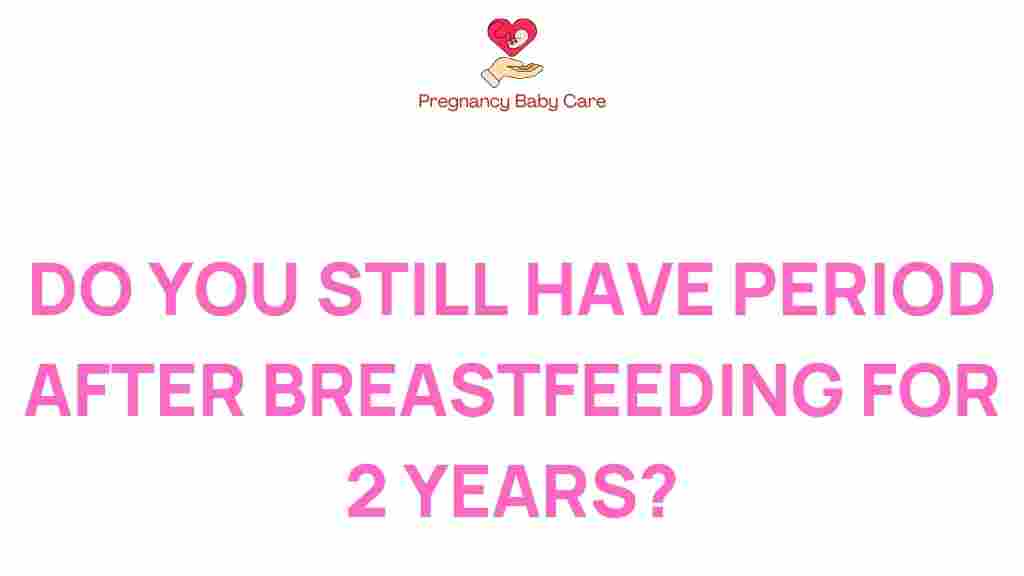The Hidden Truth: Do You Still Have Your Period After Two Years of Breastfeeding?
Breastfeeding is a beautiful journey that many mothers embark upon after childbirth. It not only nourishes the infant but also plays a significant role in a mother’s postpartum recovery. One of the many questions mothers have during this time is about their menstrual cycle and whether they will still have their period after two years of breastfeeding. In this article, we will delve into the relationship between breastfeeding and menstruation, addressing how lactation affects hormones, fertility, and overall women’s health.
Understanding the Menstrual Cycle and Breastfeeding
The menstrual cycle is a complex process regulated by hormones. After giving birth, a woman’s body goes through numerous changes as it recovers from pregnancy and childbirth. During the postpartum period, many women experience a delay in the return of their periods, especially if they are breastfeeding exclusively.
Breastfeeding stimulates the production of prolactin, a hormone that helps milk production. High levels of prolactin can suppress ovulation, which in turn can delay the return of menstruation. This natural phenomenon is known as lactational amenorrhea.
Factors Influencing Menstrual Cycle Return
Several factors can influence when a woman may expect her menstrual cycle to return while breastfeeding:
- Type of Feeding: Exclusive breastfeeding typically delays the return of menstruation longer than mixed feeding (combination of breastfeeding and formula).
- Frequency of Nursing: The more frequently a mother nurses, the more prolactin is produced, which can prolong amenorrhea.
- Infant’s Age: Many women may find that their period returns around the time their child starts eating solid foods, around 6 months to 1 year of age.
- Individual Hormonal Fluctuations: Each woman’s body is different; some may experience a return of their menstrual cycle sooner than others.
The Postpartum Experience: What to Expect
During the postpartum period, your body is adjusting to the absence of pregnancy hormones. Here are some key points to consider:
- Initial Bleeding: After childbirth, women experience lochia, a discharge that may last several weeks. This is not a menstrual period but is often confused for one.
- Hormonal Changes: As breastfeeding continues, hormones like estrogen and progesterone fluctuate significantly, impacting your menstrual cycle.
- Physical Recovery: The body needs time to heal. Factors such as stress, sleep deprivation, and overall health can influence menstrual cycle resumption.
When Will Your Period Return?
For many women, periods may return anywhere from three months to two years after childbirth, depending on breastfeeding practices. Some women may not have a period for the entire duration of breastfeeding, especially if they are nursing exclusively. However, once breastfeeding frequency decreases or if complementary foods are introduced, many women find that their periods return.
Fertility and Breastfeeding
It’s important to understand that while breastfeeding can delay ovulation and menstruation, it is not a foolproof method of contraception. Some women may ovulate before their first postpartum period, making it possible to conceive again while still nursing. This can be surprising for many mothers who believe that breastfeeding alone will prevent pregnancy.
For those seeking to avoid pregnancy, it’s advisable to use additional contraception methods, especially if their menstrual cycle is irregular during the breastfeeding period.
Signs Your Period May Be Returning
As you navigate the breastfeeding journey, you might notice signs that your menstrual cycle is on its way back:
- Changes in Milk Supply: Some mothers report a decrease in milk supply as hormonal levels begin to shift.
- PMS Symptoms: You may start experiencing symptoms commonly associated with premenstrual syndrome, such as mood swings, bloating, or cramping.
- Spotting: Light spotting or unusual discharge may indicate that your period is returning.
What If Your Period Doesn’t Return?
If your period does not return after two years of breastfeeding, it’s often not a cause for concern, especially if you are still nursing frequently. However, if you have concerns about your menstrual health or fertility, consider consulting a healthcare provider. Conditions such as hormonal imbalances or thyroid issues may warrant further investigation.
Tips for Managing Your Menstrual Cycle While Breastfeeding
As you transition back to regular menstruation, here are some tips to help manage your menstrual cycle:
- Keep Track of Your Cycle: Use a calendar or an app to monitor your cycle, symptoms, and any changes in your body.
- Maintain a Healthy Lifestyle: Eating a balanced diet, staying hydrated, and getting regular exercise can positively impact your menstrual health.
- Stay Informed: Educate yourself about postpartum health and discuss any concerns with a healthcare professional.
Conclusion: Embracing Motherhood and Menstrual Health
In conclusion, the relationship between breastfeeding and the menstrual cycle is complex and varies greatly among women. While it is common for periods to be delayed during breastfeeding, especially when nursing exclusively, every woman’s experience is unique. Understanding how lactation affects hormones, fertility, and overall women’s health can empower mothers to embrace their postpartum journey.
Whether your period returns after a few months or two years, know that you are not alone in this experience. Each stage of motherhood brings its own set of challenges and triumphs, and being aware of your body’s changes is an essential part of maintaining your health.
For more information on women’s health and postpartum recovery, you can explore this resource. Remember, if you have specific concerns about your menstrual cycle or breastfeeding, don’t hesitate to reach out to your healthcare provider.
This article is in the category Health and created by PregnancyBabyCare Team
